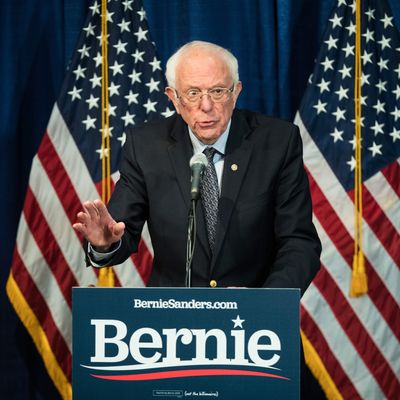
In the long, strange twilight state of the once-red-hot 2020 Democratic presidential nominating process, Joe Biden is being treated as the presumptive nominee by most objective observers and less objective party figures who want the general election contest to begin instantly. But the other person who has a say in when the nominating contest is over is Bernie Sanders, and he’s not showing signs of going anywhere soon, as The Week reports:
Sanders, who remains about 300 delegates behind former Vice President Joe Biden in the race for the Democratic presidential nomination, was Late Night with Seth Meyers’ first remote guest of the COVID-19 pandemic Monday night. Meyers asked Sanders if he still saw a path to the nomination, “and if not, why are you remaining in the race?” Sanders had an answer for both questions.
Acknowledging the delegate count, Sanders said “we have a path,” but “it is, admittedly, a narrow path.” “We have a strong grassroots movement who believe that we have got to stay in the race” to fight for his platform’s principles, Sanders continued. “We need Medicare-for-all,” to “raise the minimum wage to a living wage,” and “paid family and medical leave,” Sanders said — issues that have been highlighted throughout the coronavirus pandemic.
Some critics will immediately compare Sanders’s desire to stick around to his stubborn persistence in 2016, beyond the point when Hillary Clinton had clearly won the nomination (behavior that some counted among the dozens of reasons for the shocking outcome of the general election). But that’s probably premature, thanks to the postponement of a host of primaries in the wake of COVID-19. According to the Associated Press, Joe Biden is still 774 pledged delegates short of the 1,991 he needs for the nomination. There are a total of 593 pledged delegates that will be awarded during primaries (and the one caucus in Wyoming) between now and June. So Biden cannot formally put this away until June 2, when another 686 delegates are at stake, and even then, proportional delegate award rules could keep the nomination theoretically undecided. Any Sanders surrender at this point might simply anticipate the inevitable defeat.
But while the radically changed primary calendar has given Sanders a stay of political execution, the immediate path ahead isn’t as inviting as it once was. Three states (Alaska, Hawaii, and Wyoming) were to hold low-turnout party-run primaries Sanders might have swept on April 4, followed by Wisconsin’s regular primary on April 7. All three April 4 states have now delayed their contests and shifted to all-mail-ballot voting.
From a psychological point of view, the Wisconsin primary (unless it is delayed by litigation) is one where a Biden win would likely add a lot of pressure on Sanders to give up. It’s a state whose Democratic Party is famously progressive. It holds an open primary where the independents who lean in Bernie’s direction are free to participate. Sanders beat Clinton there in 2016 by ten points. And the state’s controversial effort to switch to a mostly by-mail primary overnight is screwed up enough that turnout will probably be depressed, which arguably might give another advantage to Sanders’s ideologically motivated base (though on the other hand, young voters do not typically vote by mail as frequently as old folks).
But signs are pointing to a Biden victory in Wisconsin. FiveThirtyEight rates a win by the former veep at a probability of 83 percent. The only polls taken there since Super Tuesday show Biden up by double digits.
If Sanders loses the Badger State, the rationale for his candidacy will likely shift from a victory scenario to the vaguer idea that he needs to remain in the race to champion his “political revolution” and its democratic-socialist policy agenda — or at least to keep Biden from taking the left for granted and pursuing a general election victory among centrist swing voters. If Sanders wins in Wisconsin, the fantasy of a huge, late comeback on the wings of a coronavirus-fueled realization that Bernie has been right all along will remain alive, if only for true believers.






























